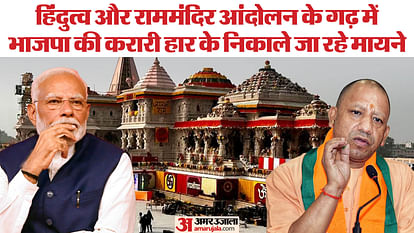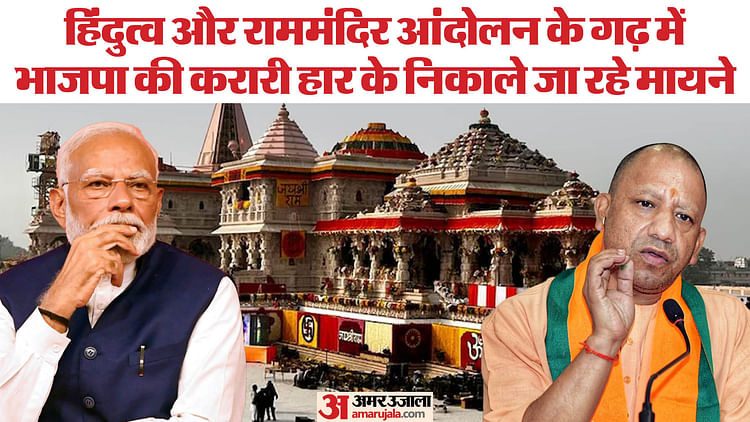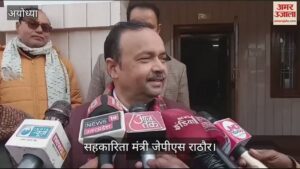
UP Election Result
– Photo : Amar Ujala
Expansion
The loss of Faizabad (Ayodhya) seat in the Lok Sabha elections has hurt the BJP deeply. It is not being seen as the loss of an ordinary seat. It is being seen as the failure of the use of BJP symbols. Many other reasons are being cited for the loss, the most prominent among them being the inaction of MP Lallu Singh on local issues and his statement on constitutional amendment.
In fact, BJP was fighting the 2024 elections by keeping the construction of Ram temple in Ayodhya at the center. To appease the Dalits, the airport was named after Maharishi Valmiki. The state and central government carried out many development works in Ayodhya. The consecration of Ram temple also took place just before the elections. Despite this, BJP lost the seat of Faizabad. People are surprised that how did BJP lose the Faizabad seat?
Experts say that the position of BJP in Ayodhya was weakening for the last three years. During the 2022 assembly elections, SP captured two assembly seats of Ayodhya district – Gosainganj and Milkipur. Whereas BJP had won in 2017 and 2019. After the assembly elections, BJP focused on the construction of Ram temple and SP was secretly preparing to win the Faizabad Lok Sabha seat.
BJP did not take it seriously. Here in 2014, BJP got 48.08 percent votes and SP got 20.43 percent votes. In 2019, BJP reached 48.66 percent and SP reached 42.66 percent. This time BJP’s share in total votes fell by about 4.85 percent to 43.81 percent. At the same time, SP’s vote share increased by 5.95 percent to 48.59 percent.
The talk of constitutional amendment infuriated the Dalits and backward classes
BJP MP Lallu Singh said in the middle of the election that a government can be formed with just 272 seats. But, two-thirds of the seats are needed to change or amend the Constitution. Leaders of India Alliance took advantage of this statement of Lallu. They tried to mobilize Dalit and backward class voters by presenting it as a conspiracy to change the Constitution not only in Ayodhya but in the entire country. BJP kept ignoring this impact in the spirit of Ram Mandir. This became a major reason among the many reasons for the defeat.
Could not understand SP’s strategy
India Gathbandhan did a big experiment to win Ayodhya in the Lok Sabha elections. Faizabad (Ayodhya) Lok Sabha seat is a general seat. Generally, in every Lok Sabha election, an equation is made between upper caste and backward caste here. Last time, Lallu Singh was from BJP, while SP had made Anandsen Yadav its candidate. BJP had won the game. This time SP changed its strategy. Instead of fielding a backward and general caste candidate as usual, they fielded a Dalit candidate. That too from the Pasi community. -The Pasi community has a vote bank of around 1.5 lakh on this seat.
Not only this, this Lok Sabha constituency also has plenty of Kurmis and Nishads. Like Pasis, these two castes have also been considered the core vote bank of BJP. In such a situation, SP balanced the political equations in the neighbouring seats as well. In Basti and Ambedkar Nagar, it fielded a Kurmi candidate, and in Sultanpur, it mobilized these castes as well by fielding a candidate from the Nishad community. The result was that for the first time after 1957, a Scheduled Caste MP was elected from the Faizabad seat. Two-time BJP MP Lallu Singh lost to SP’s Milkipur MLA Awadhesh Prasad by 55,000 votes.
BJP remained overconfident
BJP has control over four of the five assembly seats in Faizabad Lok Sabha constituency. Only Awadhesh Prasad was an MLA from Milkipur. BJP was excited about the inauguration of Ram Mandir and the corridor being built there. Party workers were also overconfident.
No attention was paid to those who suffered the brunt of development
BJP did a lot of development work in Ayodhya. It was looking at the inauguration of Ram Mandir and the work done there as a political rudder not only in Ayodhya but in the entire country. But, something else was going on behind the scenes. There was a large section of the local people of Ayodhya who were unhappy with being displaced in the name of development.
They believed that they had to pay the price for this development. Local traders were repeatedly raising the issue of acquisition and compensation. They were also upset with barricading at various places, police arrangements, route diversion and VIP culture. The local MP was nowhere to be seen to solve their problems.



